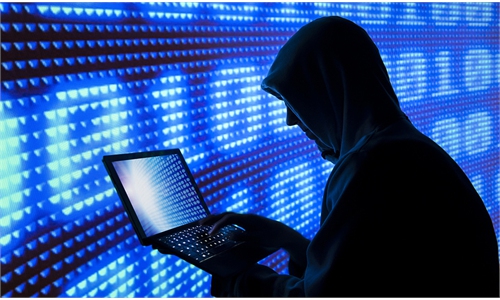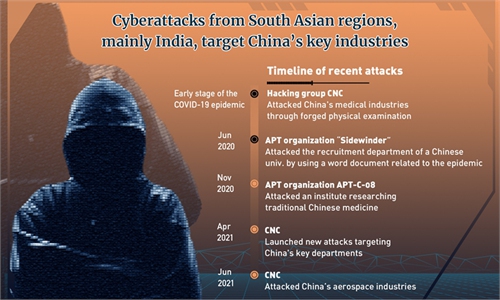China seeks cyber civilization with positive forces and strength in new era, different from West’s ‘money-driven digitalized society’

Photo: IC
Experts said the internet civilization that China advocates is a new form of civilization filled with positive forces and strength of kindness, where China aims to explore the establishment of new means of communication between individuals, nations, a new model of online governance as well as new rules in online infrastructure construction. That differentiates from the cyberspace governance centered on internet enterprises in the West, which has failed and is chaotic.
Chinese President Xi Jinping sent a congratulatory letter to the conference, calling for extensively pooling of positive forces and the strength of kindness while also making joint efforts to create a better cyberspace.
Among the 10 major events connected to China's cyberspace civilization construction in the new era released at the conference are rectification actions in cleaning up the internet including the "fan culture" that distorts minors' values, endangers social governance, judicial organs' crackdown on behavior to defame martyrs in accordance with the Heroes and Martyrs Protection Law, as well as the adoption of laws such as the Data Security Law.
Shen Yi, deputy director of the Fudan University Cyberspace Research Center, told the Global Times on Friday that the China Internet Civilization Conference is a groundbreaking meeting to discuss, not how to require netizens to act polite and civilized on the cyberspace, but to study new features and character of human beings' civilization in the digital economic era.
To better comprehend "cyber civilization," Shen said it is another form of a human community with a shared future in the digital economy and cyberspace, which covers new means of production, new means of communication between individuals and nations, a new model of governance both domestically and internationally, as well as new gaming rules in online infrastructure construction.
The kind of cyber civilization that China mentions differentiates from the cyberspace that the West has already formed, which was simply viewed by them as a money-driven digitalized society, Shen said.
The network ecosystem, centered on internet enterprises from the West, is already a past tense and has been declared to be a failure given the chaos it has caused, such as the resurgence of Arab Spring, rise of Trump on Twitter and wide circulation of rumors related to COVID-19, Shen explained.
The cyber civilization advocated in the West is a neoliberal model and established based on idealized notions of the omnipotence of the market and the absolute rationality and freedom of individuals, Shen added.
The conference gathered representatives from major internet Chinese companies, including Alibaba, Tencent, Baidu and ByteDance. The China Federation of Network Social Organizations (CCSOS) and and internet enterprises launched an initiative to build a civilized internet at the conference.
They agreed to always make social well-being a priority and promote core socialist values and maintain a correct political orientation.
This year, China's cyberspace regulator enhanced rectification with specific measures over the sick parts of "fan circle" culture in the entertainment industry, tackling the long-controversial moves by teenage fans that blindly idolize celebrities, excessively spend money on their idols and exclude others.
The Supreme People's Procuratorate said it has been working on forming a culture of respecting heroes in society. Based on the Heroes and Martyrs Protection Law, some internet influencers such as "Labixiaoqiu" with more than 2.5 million followers received a jail term of eight months for defaming martyrs.
Officials from the Ministry of Public Security also revealed at the conference that an average of more than 5,000 cases of violating citizens' personal information were identified per year and 10 cases of facial information trafficking were registered in 2020.
Xi's letter and the 10 major events clearly state the multiple responsibilities of the government, internet platforms, social organizations and netizens to achieve the goal for such a civilization, Qin An, head of the Beijing-based Institute of China Cyberspace Strategy, told the Global Times on Friday.
Qin believes since the 18th National Congress of the CPC, China has formed a solid legal foundation to protect cyber civilization and the internet has become a cleaner environment. Judging from the 10 major events, an effective frame on how to promote a civilized internet has been formed.
All those achievements reflect China's aim to establish a civilized internet as it enters an initial stage of high-quality development. But it is still far from being mature, Qin said, adding that challenges remain. China's cyberspace continues to suffer from frequent cyberattacks overseas, fake information, and a profit-driven market.
Zhu Wei, a communications researcher at the China University of Political Science and Law in Beijing, believes China will lay more efforts to promote "honesty" in cyberspace governance including honesty of netizens and internet platforms. In the future, netizens' honesty and behavior in cyberspace will likely be integrated with the credit disciplinary mechanism, Zhu noted.



